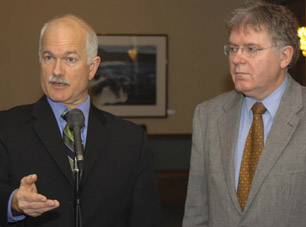Afghan documents deal at last .. NDP may have a point, but .. (and but again?)
Jun 16th, 2010 | By Counterweights Editors | Category: In Brief
Federal NDP Leader Jack Layton (left) and St. John's East MP Jack Harris probably do have a point of principle on the Afghan detainee issue. But is it worth a snap federal election? Photo: Garry Hebbard, The Telegram.
[UPDATED BELOW – JUNE 16, 1:45 PM; JUNE 18, 2:40 PM]. So the crazed prospect that there just might be a snap Canadian federal election, triggered by some ultimate failure to agree on managing Afghan detainee documents, among the four political parties currently represented in Parliament, seems to have at least almost ended. We speculated lightly on the subject this past weekend, and then again Monday morning. (See below or CLICK HERE.) But now – as of Tuesday, June 15, 2010 – at least three parties, representing an overwhelming parliamentary majority, have agreed on practical details for implementing last month’s agreement in principle.
See “Liberals hail detainee deal, dismiss NDP objections as ‘horsefeathers‘” in the Globe and Mail, and “Deal reached on detainee documents – but NDP pulls out,” in the Vancouver Sun, for just what the ultimate details have proved to be.
From the Globe and Mail report we learn that the agreement among the Conservatives, Liberals, and Bloc Quebecois “allows for a three-person panel of eminent jurists – the opposition has a veto over who sits on this panel –Â to first review the documents. As well, each party has two MPs on the [parliamentary] committee” that will oversee the process, and review all documents not excluded by the eminent jurists.
The Vancouver Sun report spells out the New Democrats’ reluctance to go along with all this somewhat more clearly: “The final agreement bars the MPs from looking at confidential cabinet documents or papers protected for reasons of solicitor-client privilege. Those exemptions were cited by the NDP as a main reason they consider the final agreement a charade and backed out at the 11th hour … Prime Minister Stephen Harper, Liberal Leader Michael Ignatieff and Bloc Quebecois Leader Gilles Duceppe are poised to sign a memorandum of understanding on the agreement, which is to be tabled in the House of Commons. That’s unlikely to happen until after House of Commons Speaker Peter Milliken responds to an NDP request to reject the deal.” At the same time, “Justice Minister Rob Nicholson questioned whether the NDP had negotiated in good faith. He said the Conservative government must honour the security classification of documents from the current and two previous governments of Liberals Paul Martin and Jean Chretien, in power at the start of Canada’s mission in Afghanistan.”
Our own quick view here is that, in principle, the NDP probably does have a point. (And it will be interesting to see just how “Speaker Peter Milliken responds to an NDP request to reject the deal.”) Yet, as a practical matter, this point is almost certainly not quite strong enough to legitimize, eg, the kind of chaos that a snap Canadian federal election would precipitate at the present juncture. Or, as we noted over this past weekend: “Given recent opinion polls, and the imminent G8 and G20 summits in Toronto and Muskoka, followed very quickly by a visit to Canada from Queen Elizabeth II, it would seem almost certifiably insane for any of the four federal parties in Ottawa today to allow this situation to deteriorate to the point where a snap election is the only way out.”
Finally, the willingness of the Bloc Quebecois to join the Liberals and Conservatives in supporting the agreement that has been reached at last gets Liberal leader Michael Ignatieff out from under the harsh perception that he really does have “no intestinal fortitude at all.” And the same situation allows the NDP to pursue the kind of principled opposition to almost anything it so often likes so much, without having to worry about the broader responsibilities of political leadership. (Even if one of those responsibilities is not really to “honour the security classification of documents from the current and two previous governments.”) The crucial point here, it seems to us, is that the fate of Afghan detainees Canadian forces have in the past handed over to Afghan forces is just not, by itself, a big enough issue to justify turning Canadian federal politics inside out, with a snap election in the early summer of 2010.
UPDATE JUNE 16, 1:45 PM: At 12:48 PM today the Globe and Mail website posted an item that underlines just how much of a point of principle the NDP does have. See “Detainee documents deal is a mess, expert says.”
The crucial political question, it still seems to us, is whether the majority of we the Canadian people want a federal election at this more or less exact time, over the Afghan detainee documents issue. Our sense remains that the answer to this question is no. (Maybe this fall, on a broader array of issues, but not right now, etc.)
And we still wonder whether the NDP would press the point as it is doing, if the main burden of deciding whether there would actually be an election were on its shoulders.
At the same time, we’d ultimately agree, the NDP is no doubt doing a good thing in some sense, by standing up for the principle, and so forth. For a report in our other official language see “Détenus afghans: le gouvernement et l’opposition s’entendent sans le NPD.”
UPDATE JUNE 18, 2:40 PM: Just a few last notes here, as the MP s fan out across the various parts of the country to which they belong, for their long summer vacation.
First, Speaker Peter Milliken has now given his blessing to the deal signed by the Conservatives, Liberals, and Bloc Quebecois – despite the protests of the NDP. You could say well what do you expect: he is a Liberal. Even so, his decision does blunt the “NDP request to reject the deal.”
Second, CLICK HERE for the full text of the final agreement. As Liberal negotiator Ralph Goodale has stressed on TV, it is the expert “Panel of Arbiters” that “can determine, at the request of the government” (paragraph 7) – and not the government all by itself – whether not to disclose information “due to the solicitor-client privilege” or “information constituting Cabinet confidences.” Mr. Goodale’s distinction here, however, does seem something of a mere formality. As the headline to the Globe and Mail report on the final text puts it, “Pact ensures sensitive detainee files will remain sealed.”
So in the end the NDP still has its point of principle – even if its ultimate practical importance is not so great as to stop everyone’s approaching summer holidays for a snap election on the subtleties of crime and punishment in the faraway turbulent land of Afghanistan, which of course does not have a “free and democratic society” quite like the one we have in Canada today.



[…] This post was mentioned on Twitter by Counterweights , Counterweights . Counterweights said: Afghan documents deal at last .. NDP may have a point, sort of, but .. http://bit.ly/dcHtaT […]
[…] (3) CONSCIENCE OF NATION RIDES AGAIN? The much more transient or ad hoc “coalition†(as it were) that has come together around the finally nailed-down Afghan detainee document agreement is somewhat different again — Conservatives, Liberals, and Bloc Quebecois. James Travers’s article in today’s Toronto Star, “Afghan document deal hides the truth … Secrecy — and Conservatives — win on prisoner abuse agreement,†just underlines, yet again, the extent to which the NDP is standing up for a “point of principle†in staying out of this last-minute concoction, as noted by the counterweights editors in “Afghan documents deal at last .. NDP may have a point, but .. (and but again?).†[…]